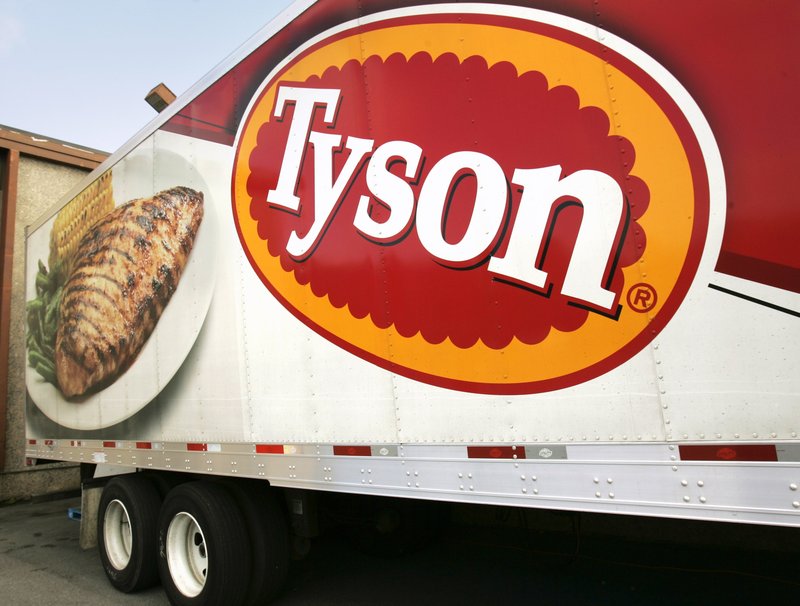Tyson Foods Inc. on Monday reported a fourth quarter profit of $692 million with strong results from its beef, pork and prepared foods segments.
For the three months that ended Oct. 3, earnings per share were $1.90 compared with $1.01 a year ago. Sales increased 5%, or $576 million, to $11.46 billion in the quarter.
Results exceeded expectations during a quarter that included pandemic-related costs and challenges. The nation's largest meat processor invested hundreds of millions of dollars in protections for its 141,000 workers since covid-19 started to spread in the spring. They included daily temperature checks and social-distancing measures at the plants. Tyson also expanded its health staff, implemented weekly testing and added on-site clinics this summer in anticipation of higher infection rates in the colder months.
Tyson's President and Chief Executive Officer Dean Banks said the company has seen a "dramatic reduction in active cases among workers" since making these investments and expects strong earnings and shareholder returns as a result.
In the fourth quarter, operating margins increased for all segments of the business compared with last year, except chicken, which had a dip in sales and income as production slowed and food service demand softened during the pandemic. Meanwhile, average prices in prepared foods increased while beef and pork decreased. Total margins were 8.8% compared with 5.5% a year ago.
"I'm pleased by our fourth quarter performance and excited about the future," Banks said in his first conference call as Tyson's CEO. After working in the tech and health industries, he joined Tyson's board of directors in 2017 and became the company's president in December. He took over CEO duties for the Springdale-based company in October.
Compared with last year, Tyson has seen 120% growth in e-commerce in the quarter and further expanded its reach into foreign markets, including its Raised & Rooted plant-based products into Europe. Banks said he expects African Swine Fever and international acquisitions to be opportunities for the company going into next year.
Earnings surpassed Wall Street expectations of $1.05 per share, according to a FactSet consensus. They came in at an adjusted $1.81 per share, beating Stephens Inc's $1.19 estimate.
This was driven by higher than expected profits and a lower tax rate, partially offset by higher expenses, Stephens analyst Ben Bienvenu said in a research brief. He also noted a $45 million windfall from mark to market impacts within Tyson's chicken segment.
"Even with this, results handsomely beat expectations," Bienvenu said. "We are pleased to see the progress the company is making during this challenging environment."
Tyson shares climbed $2.39, or 3.8%, to close Monday at $64.74 on the New York Stock Exchange.
Sales and operating income increased across all segments in the fourth quarter compared with last year, except for chicken and international. Tyson recorded $200 million in covid-19 costs linked to worker absenteeism, production downtime and personal protection equipment, among other circumstances.
Beef sales and profits increased by $411 million and $140 million, respectively. Pork sales grew by $110 million and profits increased six-fold to $174 million.
Chicken sales and profits declined by $14 million and $4 million, respectively. Banks said one of the biggest reasons for this was "not having full staffing levels," which has translated to higher costs per pound.
International sales declined by $22 million and the segment had a net loss of $13 million.
Meanwhile, prepared foods sales and profits increased by $124 million and $145 million, respectively. These results came from strong retail demand, but were offset by reduced foodservice demand, Banks said.
According to company data, Tyson is outselling the food and beverage industry more than 3:1, surpassing ConAgra, Kraft Heinz and others.
Tyson had $3.2 billion in liquidity as of Oct. 3, 2020, and reduced its debt by $690 million in the quarter.
Looking ahead to next year, Bienvenu noted that Tyson expects beef and pork results to stay strong and for chicken and prepared foods to get better, despite lower sales volumes and incremental costs.
Tyson executives provided an outlook for 2021 and expected to accrue $330 million in pandemic-related expenses. They are expecting revenue to be between $42 billion and $44 billion next fiscal year and capital expenditures to be between $1.2 billion and $1.4 billion.
For the past year, Tyson reported a gross profit of $2.14 billion compared with $2 billion in the twelve months that ended in 2019.
Earnings per share climbed 34 cents, or 6%, to $5.86. Annual sales increased less than 1% to $43.2 billion.
Total margins for fiscal 2020 were 7.2% compared to 6.7% last year. Tyson generated $3.9 billion in operating cash flows in the past year.
The meat and poultry giant has spent $540 million in efforts to protect its workers and keep operations running through the pandemic.

